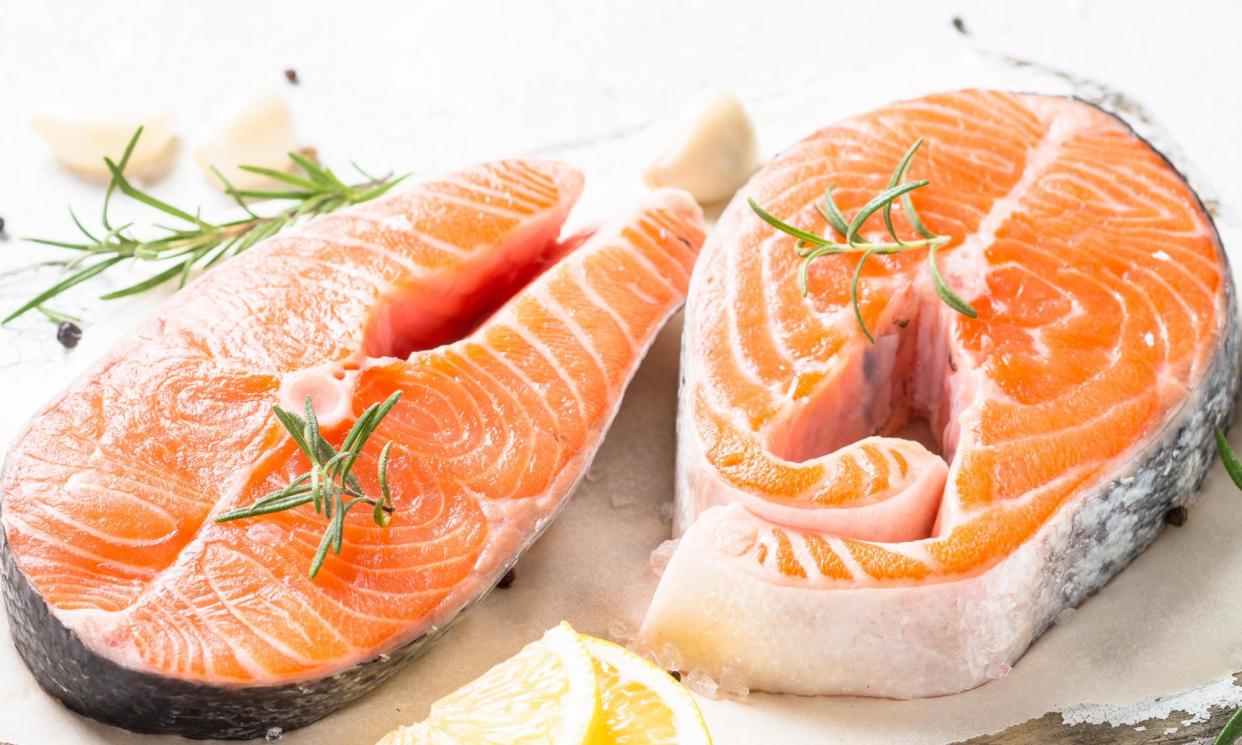Coles, Woolworths and Aldi ‘responsibly sourced’ salmon labels may be misleading, watchdog told

Major supermarkets may be misleading consumers that their salmon products are responsibly sourced as some is produced in Tasmanian farms that are “far from sustainable”, environmental groups say.
The Environmental Defenders Office, acting on behalf of four environmental groups, has made a complaint to the consumer watchdog, urging it to investigate whether “responsibly sourced” labelling on seafood products and promotional material used by Coles, Woolworths and Aldi have broken consumer law by misleading consumers.
They allege the claim by supermarkets that salmon is responsibly sourced is unqualified and may constitute greenwashing. They claim about 10% of Tasmanian salmon is sourced from Macquarie Harbour salmon farms.
Related: Tasmanian salmon farms could face restrictions to save endangered fish
In September, the federal threatened species scientific committee reported the degraded water quality in Macquarie Harbour due to the salmon industry was having a “catastrophic” impact on the Maugean skate, an ancient fish thought to be found only in the vast harbour on the state’s west coast.
“When a company makes false claims about its products, it wrongfully gains a competitive advantage by misleading customers who want to do the right thing,” said Kirsty Ruddock, a lawyer at the Environmental Defenders Office, which made the claim to the Australian Competition and Consumer Commission (ACCC) on behalf of Living Oceans Society, Neighbours of Fish Farming, the Bob Brown Foundation and Ekō.
“Our clients allege Aldi, Coles and Woolworths may have used misleading or deceptive statements to capitalise on the public’s strong preference to buy sustainably farmed salmon.”
The environment minister, Tanya Plibersek, launched a consultation in November to examine whether the salmon industry had the approvals it needed to operate in Macquarie Harbour. The move came after an application was made under the environment laws by the Australia Institute, the Bob Brown Foundation and the Environmental Defenders Office, who argued the industry was affecting the Maugean skate.
In July, more than 80 organisations around the globe called for two international accreditation schemes – Best Aquaculture Practices (BAP) and Global G.A.P (GGN) – to revoke sustainability certifications for salmon and trout farmed in Tasmania’s Macquarie Harbour, arguing the certification was misleading.
The complaint to the ACCC by the Environmental Defenders Office points out the RSPCA and the Aquaculture Stewardship Council no longer endorsed certified salmon sourced from Macquarie Harbour farms after its environmental impacts became known.
Related: Coles and Woolworths to face Senate scrutiny amid claims of profiteering
In August, the environmental groups wrote to Woolworths, Aldi and Coles pointing to evidence of the Maugean skate’s decline due to salmon farming and requested they stop procuring salmon from the farms and remove the “responsibly sourced” logo from the packaging.
“No urgent due diligence by way of removing the product from shelves, or at the very least the removal of environmental claims, has been taken by the supermarkets or certifications to date,” said Kelly Roebuck, the SeaChoice representative from Living Oceans.
“Marketing extinction as ‘responsible’ and ‘best practice’ is greenwashing at its worst.”
A spokesperson for Woolworths, whose seafood sourcing policy states it prefers to source seafood that is certified by the Aquaculture Stewardship Council and is assessed against BAP and GGN standards, said it had stringent protocols to ensure products met its policy.
“We are aware of the concerns regarding Macquarie Harbour farms and take this matter seriously,” a spokesperson from Woolworths said. “We note that the industry, state and federal governments are taking this matter seriously and that a review is under way along with investment into research to better understand the issue and protect the Maugean skate.
“We will continue to closely monitor developments.”
Coles was contacted for comment but did not respond before deadline. Aldi declined to comment.

 Yahoo News
Yahoo News 
